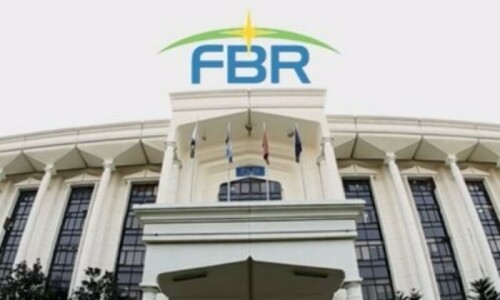GOVERNMENTS propose, bureaucrats dispose — often relegating ‘plans’ to an existing pile of schemes gathering dust.
The ‘drastic measures’ suggested by the country’s tax bureaucracy to strengthen ‘enforcement and compliance’ are no different from similar, discarded strategies to boost revenue collection. To begin with, the new tax enforcement mechanism goes against the very objective of broadening the tax net and documenting the economy, as it is squeezing middle-class taxpayers further while letting tax evaders off the hook.
That is not surprising, since the new measure perpetuates a tax policy that burdens compliant taxpayers, instead of bringing tax evaders into the net. The enforcement scheme, approved by the prime minister, stops those who do not pay their income tax from purchasing assets such as cars, immovable property and financial instruments, and from opening bank accounts.
However, it does not propose any step to abolish the category of non-filers that exists only in Pakistan. Likewise, FBR proposes penalising unregistered and non-compliant businesses — manufacturers, retailers, wholesalers, etc — hoping that the new steps against non-filers and non-compliant businesses will force them to eventually become taxpayers.
The scheme divides active taxpayers into two distinct classes: those who declare their annual income as less than Rs10m, and those who report an income above this threshold. The proposed tax enforcement and compliance project assumes, without any evidence though, that every taxpayer falling in the first category must have underreported their incomes and should be treated as tax thieves and at par with those who do not file their taxes.
Thus, they are also liable to face the same restrictions when they go shopping for cars and immovable property or invest their money in financial instruments, unless they can explain their ‘source of income’. They, nevertheless, are allowed to maintain bank accounts. However, no questions will be asked of those whose declare an annual income that is greater than Rs10m. For them, everything will be kosher.
More importantly, the mechanism increases the discretionary powers of the taxmen and opens new avenues of corruption for them, while simultaneously overriding the provisions contained in the laws to selectively and randomly audit the accounts of a certain percentage of taxpayers every year to detect underreporting of incomes.
Similarly, the tax laws also provide for punitive actions against those who under-declare their incomes in their annual tax statements or do not pay taxes at all. If there are any legal loopholes, those should be plugged forthwith. We do not need new fancy mechanisms or schemes to tax those who do not pay their taxes or punish those who steal taxes. What we need is an equitable and just tax system, an efficient and honest machinery, and, above all, strong political will to broaden the base and boost revenues.
Published in Dawn, September 23rd, 2024
















































